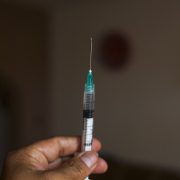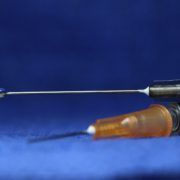Shoulder Still Hurting After Your Covid-19 Booster?
Shoulder pain is quite normal after any vaccine.
But prolonged shoulder pain isn’t.
Shoulder injuries related to vaccine administration (otherwise known as “SIRVA”) is a rare, but possible occurrence when you get a vaccine or booster shot. Shoulder injections should enter the deltoid muscle. But SIRVA occurs when a healthcare professional administers the vaccine too high, or too deep into your shoulder.
When not properly administered, your next booster shot could graze your bone or nerve, or even puncture your bursa (a fluid-filled sac that protects your shoulder tendons).
Pain from SIRVA can be really difficult to distinguish from the normal pain that occurs after a shot in your arm. But it’s critical you know what to look for. Because if left untreated, SIRVA can cause prolonged problems in your shoulder over time.
I’ve seen folks end up with entirely preventable rotator cuff tears, bursitis, and tendonitis – all because someone didn’t take their complaints of shoulder pain after getting a Covid shot in their arm seriously enough.
Normal shoulder pain after a Covid vaccine or booster shot:
Mild skin sensitivity and localized shoulder pain is quite normal after a Covid vaccine or booster shot. Some people experience what is now known as “Covid arm” – a mild rash and skin sensitivity that can occur anywhere from a few days to even a week after receiving your shot. You’ll experience skin sensitivity and/or swelling that might look similar to cellulitis.
While annoying, Covid arm is not considered dangerous or threatening.
The symptoms will typically go away after a week or two and in the meantime, talk to your doctor or pharmacist about over the counter or prescription remedies that can address the symptoms of itchiness or swelling.
Localized shoulder pain at the site of your vaccine or booster shot is also normal. The pain you feel is from the mild trauma caused by the needle being inserted into the soft tissue (muscle) of your arm. It often feels like a bruise, and you may experience a little bit of swelling. It will typically go away after 2-3 days. Even though your arm can be quite sore, the important distinction here is that you’ll still have full, normal function of your arm. In other words, despite the soreness, you can still move your arm freely up and down if you had to without restriction.
Your arm soreness will go away with time, but gently massaging the area of pain, and even some easy movement or exercise can help the soreness go away faster.
Abnormal shoulder pain after a Covid vaccine or booster shot:
The symptoms of SIRVA are different, and typically more severe than what I’ve just described above. If not addressed, some of these symptoms could lead to long lasting shoulder problems or compensatory problems elsewhere.
As I’ve already alluded to, one of the main distinctions between “normal” shoulder pain after a vaccination shot and SIRVA is how well your arm functions. If the needle was accidentally inserted into your joint capsule, for example, you will notice limited mobility and possibly limited strength. If unaddressed, symptoms like this can manifest into more serious shoulder problems down the line such as adhesive capsulitis or frozen shoulder.
If the needle was inserted too high or too deeply, and beyond your muscular layer, it could have injured your bursa. This could cause it to become inflamed, turning into shoulder bursitis. Your mobility may or may not be impacted when this happens, but you’ll notice prolonged shoulder pain that doesn’t subside after 2-3 days like it should. Bursitis is actually a really simple injury to treat. But with SIRVA, it’s often dismissed as normal pain after the shot.
When ignored – shoulder bursitis can lead to compensatory movements due to pain – and cause problems later on in places like your neck, shoulder blade or even elbow.
One last common problem we see as a result of SIRVA is rotator cuff tendonitis. Much like bursitis, you may have normal motion in your shoulder, but what you’ll notice with this is again, the pain will persist longer than it should. But unlike bursitis, you’ll also have pain and weakness when you exert force through that tendon – particularly with overhead movements or lifting something with an outstretched arm.
This is also not a complicated injury to rehabilitate, but if not addressed, could turn into a more serious problem such as a rotator cuff tear or chronic tendonosis – conditions that are more difficult to treat.
To recap – your shoulder will hurt after getting a vaccine.
It’s normal. And you may even experience Covid arm. But these symptoms should go away and not remain.
And you should still have normal function of your shoulder, despite the pain.
If you have shoulder pain that persists, and especially if you’re noticing limited mobility, it’s something worth getting checked out. The last thing you want is for these symptoms to go on longer than needed, or turn into compensatory, more complicated problems.
The good news is that even with SIRVA, your shoulder pain can be successfully treated naturally, and without medications or procedures. Don’t let a healthcare professional brush off your concerns and blame your prolonged shoulder pain on your booster shot.
Talk to a musculoskeletal expert who understands this sort of thing and get some help!
CLICK HERE to request a Free Discovery Call with our Client Success Team.
They’ll let you know if we can help – and if you’re a good fit for our services – get you scheduled as soon as possible.
Dr. Carrie Jose, Physical Therapist and Pilates expert, owns CJ Physical Therapy & Pilates in Portsmouth and writes for Seacoast Media Group. To request a free copy of one of her guide to neck and shoulder pain CLICK HERE or to get in touch, email her at [email protected].



